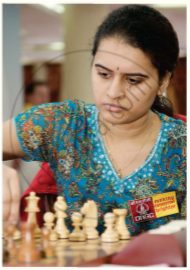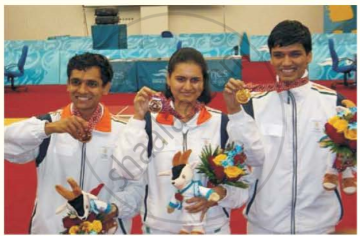Advertisements
Advertisements
प्रश्न
What major decision did that Dog take?
उत्तर
That dog decided to become the servant of one who was stronger than anyone on earth. He set out to find such a master.
APPEARS IN
संबंधित प्रश्न
Thinking about the Poem
Do you think that the old lady would have been so ungenerous if she had known who Saint Peter really was? What would she have done then?
Thinking about the Poem
What is the snake trying to escape from?
Avik, a correspondent for his school magazine, interviews Grandmaster Koneru Bumpy. Let us read :
INTERVIEW WITH KONERU BUMPY
Avik : Good morning, Ma'am! Congratulations on your achievements in the World Grand Prix Women's Chess Championship in Istanbul recently!

Koneru Humpy : Thank you! This is my biggest win in the women's circuit. This is very significant, considering that it has come in an event which had three former world champions.
Avik : Indeed! Please tell us something about yourself, Ma' am!
Koneru Humpy : I was born in Gudivada, near Vijaywada, in Andhra Pradesh on March 31, 1987. I was originally named 'Humpi' {which means champion) by my father Mr Koneru Ashok, who later changed the spelling to Humpy, to give the nrune a Russian flavour. I write my family name , Koneru, before my given name, as is the convention with the Telugu speaking people. I started playing chess when I was 5 years old.
Avik : Who introduced you to the game?
Koneru Humpy : My father acquainted me with the game. He is also my first coach. I first showed interest at the age of 6 years, when I watched him play a game and suggested a move. Indeed it was the move that actually got me into the game.
Avik : Your father left his teaching profession to make you a champion !
Koneru Bumpy : Yes, when I took the 4th place in the Indian Under 8 Championship in 1995, he decided to leave his career and dedicate his time to me.
Avik : And you had won four World Championship at a very early stage.
Koneru Bumpy : Yes, the World Girl Under 10, the World Girls Under 12, the World Girls Under 14 and World Girls Junior Chrunpionships. I acquired my IM title in 1999 and in May 2002, I achieved my 3rd GM Norms in Elekes Memorial Grandmaster Tournrunent in Budapest.
Avik : You held the record from 2002 to 2008 for the youngest woman ever to become a grandmaster!
Koneru Bumpy : Yes, I achieved it at the age of 15 years, 1 month, 27 days, beating Judit Polgar's previous record by 3 months; which was later lost in the Women's World Chess Championship in 2008 to Hou Yifan. I won the World Junior Girls Chess Championship in 2001 and won the edition or North Urals Cup, the Women's Super Tournrunent held in Krasnoturinsk. In 2006, I participated in the Women's World Chess Chrunpionship, but my crunpaign had to end early in the second round. I played in the first board of Monte Carlo Chess Club and won the last two editions of the European Club Cup.
Avik : You have got some awards also !
Koneru Humpy : Yes, Arjuna Award in 2003, Padmashri Award in 2007 and Raja-Lakshmi Award in 2008.

Avik : In India, many young chess players are ready to take a break in education and are fully focussed on chess preparations. What are your views?
Koneru Humpy : I don't think that taking up chess as a career and completely neglecting studies will be necessary at an earlier stage. After getting to a certain level in the game, they themselves should decide their preferences i.e. whether to play seriously or not.
Avik : What advice would you offer to parents of enthusiastic and talented chess children?
Koneru Humpy : Parents should not compel children to play chess. If children are genuinely interested in the game, they should encourage them. But they shouldn't hurry to get results.

Avik : How often do you exercise? Do you think daily physical exercise can help a chess player to cope with the pressure and increase the brain's ability to concentrate?

Koneru Humpy : I spend around one hour per day on physical exercise. Exercise is a must for every chess player. As the proverb says, 'a sound mind in a sound body'. Exercise shows a lot of impact on the brain.
Avik : Thank you for talking to me and giving valuable advice.
Koneru Humpy : Thank you.
This woman had been despised, scoffed at, and angrily denounced by nearly every man, woman, and child in the village; but now, as the fact of, her death was passed from lip to lip, in subdued tones, pity took the place of anger, and sorrow of denunciation.
Neighbours went hastily to the old tumble-down hut, in which she had secured little more than a place of shelter from summer heats and winter cold: some with grave-clothes for a decent interment of the body; and some with food for the half-starving children, three in number. Of these, John, the oldest, a boy of twelve, was a stout lad, able to earn his living with any farmer. Kate, between ten and eleven, was bright, active girl, out of whom something clever might be made, if in good hands; but poor little Maggie, the youngest, was hopelessly diseased. Two years before a fall from a window had injured her spine, and she had not been able to leave her bed since, except when lifted in the arms of her mother.
“What is to be done with the children?” That was the chief question now. The dead mother would go underground, and be forever beyond all care or concern of the villagers. But the children must not be left to starve.
Read the extract given below and answer the question that follow.
Describe the three children.
Mrs. Thompson did not reply, but presently turned towards the little chamber where her husband had deposited Maggie; and, pushing open the door, went quietly in. Joe did not follow; he saw that, her state had changed, and felt that it would be best to leave her alone with the child. So he went to his shop, which stood near the house, and worked until dusky evening released him from labor. A light shining through the little chamber windows was the first object that attracted Joe’s attention on turning towards the house: it was a good omen. The path led him by this windows and, when opposite, he could not help pausing to look in. It was now dark enough outside to screen him from observation. Maggie lay, a little raised on the pillow with the lamp shining full upon her face. Mrs. Thompson was sitting by the bed, talking to the child; but her back was towards the window, so that her countenance was not seen. From Maggie’s face, therefore, Joe must read the character of their intercourse. He saw that her eyes were intently fixed upon his wife; that now and then a few words came, as if in answers from her lips; that her expression was sad and tender; but he saw nothing of bitterness or pain. A deep-drawn breath was followed by one of relief, as a weight lifted itself from his heart.
Read the extract given below and answer the question that follow.
What attracted Joe’s attention after he returned from the day’s work?
How long does it take for a grub to become a complete ant?
Messengers were sent throughout the kingdom
Mark your choice.
Discuss these questions in small groups before you answer them.
When is a grown-up likely to say this?
Don’t talk with your mouth full.
What makes the child comfortable the next time he sees the garden snake?
Fill in the blank in the sentence below with the words or phrases from the box. (You may not know the meaning of all the words. Look such words up in a dictionary, or ask your teacher.)
Some people find household —————— a bore, but I like to help at home.
Multiple Choice Question:
When does the flier have to run?
Talk to your partner and say whether the following statement is true or false.
Camels store water in their humps.
Why does the rebel demand for the rain when everybody is praising the sun?
What did the dog do to lead the farmer to the hidden gold?
Read the following extract from Maya Angelou's poem, 'I Know Why the Caged Bird Sings' and answer the questions that follow:
|
But a caged bird stands on the grave of dreams |
- How does Angelou describe the state of the free bird in the opening lines of the poem? [3]
- Give a brief description of the caged bird's physical and mental condition. [3]
- Explain the phrase, 'grave of dreams' in your own words.
What does the caged bird sing about? [3] - The 'free bird' and the 'caged bird' in the poem represent different groups of people. Name them.
Name any one group of people that you would call 'caged birds' in today's world. [3] - What does the title of the poem, 'I Know Why the Caged Bird Sings', tell us about Maya Angelou's life?
Mention two ways in which the world of the caged bird differs from that of the free bird. [4]
Where did B. Wordsworth live in the short story, B. Wordsworth?
In the poem, We are the Music Makers, what are the 'sea-breakers'?
Which of the given options contains the figure of speech that appears in the following line from Leigh Hunt's poem “The Glove and the Lions’: ‘Ramped and roared the lions’:
Select the option that shows the correct relationship between statements (1) and (2) from William Sleator’s short story, ‘The Elevator’.
Statement 1: Terrified of the fat lady in the elevator, Martin ran down the dark stairs, fell and broke his leg.
Statement 2: Angry and disappointed that his son had behaved like a fool and a coward, Martin’s father did not talk to him on the way to the hospital.
The Medicine Bag traces the narrator’s attitude to his Sioux Grandfather, from mild embarrassment to appreciation. Summarise the reasons for this embarrassment and the change. Write your answer in 100-150 words incorporating the following details.
- Reasons for embarrassment
- Specific reasons for the change in attitude
